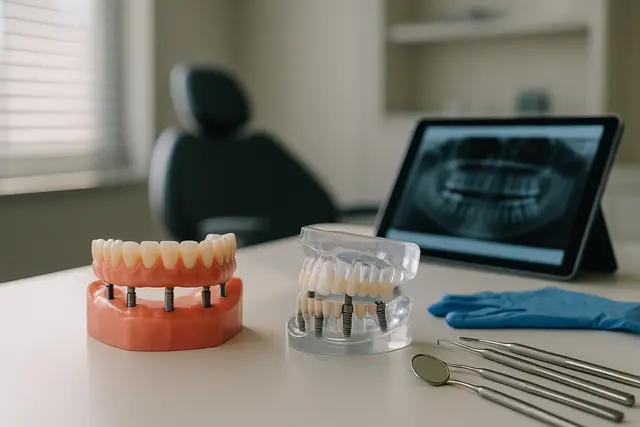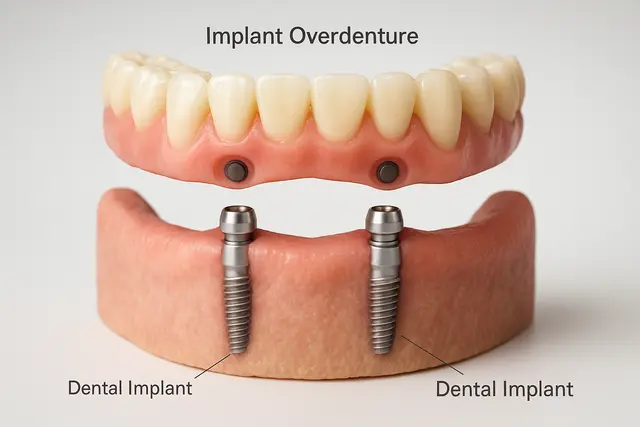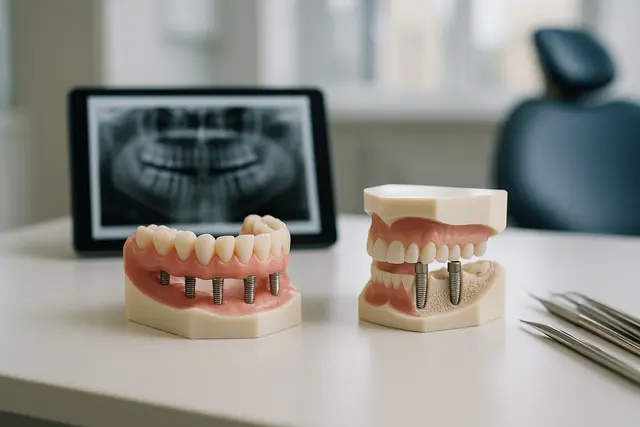Prosthodontics
6 min read
Jul 10, 2025
Living With Dentures at 50: What to Expect and How to Thrive
Turning 50 can come with a few surprises, needing dentures might be one of them. Whether it’s due to gum disease, chronic dental issues, or plain old genetics, many adults find themselves facing tooth loss earlier than expected. But here’s the thing: living with dentures doesn’t mean giving up on comfort, confidence, or good oral health.

When you think of dentures, your mind might skip ahead a couple of decades. So, if you’re adjusting to life with a denture at the age of 50, you’re not alone, and you’re definitely not “too young” for dentures.
In fact, tooth loss can happen to adults at any stage, thanks to genetics, gum disease, trauma, or chronic illnesses. And while it might feel like a lot to take in, living with dentures doesn’t mean sacrificing comfort, confidence, or your favorite foods. It just means adjusting, and yes, thriving, with your new dental routine.
Let’s walk through what that really looks like, without sugarcoating it or turning this into a lecture. Just straight talk, practical tips, and a little reassurance.
The Truth About Dentures at 50: You’re Not Alone
More adults in the United States than you might think begin wearing dentures before the so-called “elderly population.” In fact, many younger patients aged 50 and up are turning to dental services to replace missing teeth, restore their oral health, and regain the ability to chew and speak comfortably. Whether due to gum disease, tooth loss doesn't discriminate.
The good news? The stigma towards dentures is fading. These aren’t your grandparents’ false teeth. Modern options are sleeker, more natural-looking, and built to last. Dentures may feel odd at first, but with the right support, you can get back to feeling like yourself, maybe even better.
What to Expect: The Early Days of Living With Dentures
First off, new dentures aren’t like slipping on a new pair of sneakers. They take time. Dentures can take a few weeks, or even months, to feel fully comfortable. You’ll have to learn how to chew again, talk a little slower, and stick to eating soft foods at first. But give it grace. Your gum tissues are healing, your bite is adjusting, and your mouth is figuring out its new normal.
You might notice extra saliva, minor soreness, or a slight loss of confidence if your speech feels off. All of this is completely normal. Use a soft-bristled toothbrush to clean your new teeth, the roof of your mouth, and your gums to stay fresh and avoid bad breath.
And while you're getting used to your teeth and dentures, don’t skip check-ins. Talk to your dentist if something feels off, like rubbing, clicking, or pressure. Ill-fitting dentures aren’t just uncomfortable; they can lead to bone loss, infections, and even poor oral health if left unchecked.
Care for Dentures: Daily Habits That Keep Things Comfortable
Denture wearing comes with a bit of a learning curve. But it’s not rocket science. Just like natural teeth, your dentures need daily TLC. That means:
Brush your denture daily using a soft-bristled toothbrush to clean off food, plaque, and bacteria.
Soak them overnight in a denture cleanser or water (not hot!) to keep them from drying out or warping.
Rinse your denture before putting it back in your mouth to avoid chemicals from the cleanser.
Clean your gums, tongue, and roof of your mouth to maintain good oral health.
Pro tip: Overcleaning or scrubbing with harsh brushes can damage the prosthetic, so treat them kindly. If your denture starts to shift, crack, or doesn’t fit right anymore, call your dentist. No duct tape, no DIY fixes.
Dental Health After Tooth Loss: It’s Not Too Late
Losing teeth doesn’t mean dental care ends. If anything, it becomes more important. Oral hygiene impacts not just your smile but your overall health, including your heart, digestion, and even mental well-being. One overlooked area? The connection between oral health status and nutrition. When your ability to eat is limited, your body misses out on key nutrients.
Complete denture wearers should also get regular dental exams to check for gum disease, sore spots, and potential infections. Just because you have no natural teeth left doesn’t mean you’re immune to dental issues.
And if you're living in rural areas where dental services may be less accessible, consider telehealth consultations or community clinics. Preventive care still matters.
Complete Dentures vs. Partial Denture: Know What’s in Your Mouth
Depending on how many teeth are removed, you might wear complete dentures or a partial denture. Here's the difference:
Complete dentures: Replace all teeth in the upper or lower jaw. These are typically used when you're without teeth entirely on one or both arches.
Partial denture: Designed to replace just a few missing teeth, often with a metal or acrylic base that clips onto your remaining natural teeth.
Both types come with their own quirks and adjustments, but neither should cause pain or serious discomfort. If they do? That’s your cue to visit your dentist for a refit.
Implant-Supported Dentures: A Game-Changer
If you’re struggling with loose removable dentures, or just want something more secure, dental implants might be worth a conversation. These tiny titanium posts are surgically placed into your jawbone, acting as anchors for your denture.
Implant-supported dentures offer better stability, preserve bone, and make it easier to bite, chew, and smile with confidence. They’re especially useful for younger patients or older adults who still have good bone density and want a more permanent option.
However, they’re not for everyone. The process can be more invasive and costly, so it’s a decision best made with your dentist.
The Truth About Removable Denture Options
Removable partial dentures and full removable dentures are still widely used and a great option for many. Just remember: "removable" doesn’t mean "optional." They need just as much care as fixed teeth.
There are different types of removable options, too, acrylic base, flexible, metal frame. Each has pros and cons depending on comfort, durability, and aesthetics. Your type of denture should be based on your oral health, lifestyle, and budget, not just what’s trending online.
Adjusting Your Mindset Towards Dentures
Let’s be honest: the psychological shift is often harder than the physical. Many people feel self-conscious, especially if they believe they’re “young for dentures.” That’s understandable, but here’s the thing, confidence doesn’t come from the number of teeth in your mouth, it comes from how you carry yourself. And a well-fitting denture gives you every reason to hold your head high.
With a beautiful smile, restored speech, and better digestion, the benefits far outweigh the awkward early weeks. Give yourself time. Surround yourself with people who get it. And don’t hesitate to laugh at the occasional lisp or clumsy bite; it gets better.
Living With Dentures Means Living Well
The age of 50 is not the end of anything; it’s a reset. Living with dentures at 50 means enjoying your favorite meals again, reclaiming your dental health, and smiling in photos without hesitation. With the right care for dentures, regular check-ins with your dentist, and a little self-compassion, you can thrive.
Remember, dentures can also be an investment in your overall health. They help prevent the nutritional consequences of tooth loss, improve your speech, and protect your jaw structure. Whether you go with complete dentures, a partial denture, or even implant options, you’re doing something good for yourself.
So keep brushing, keep smiling, and treat your denture like the partner it is. It’s not just about replacing what was lost; it’s about living fully with what you’ve gained.
Is 50 Too Young to Start Wearing Dentures?
Not at all. Many adults begin wearing dentures in their 40s or 50s due to gum disease, injury, or tooth decay. Modern dentures are natural-looking, comfortable, and designed to support both your oral health and lifestyle, regardless of age.
How Long Does It Take to Adjust to New Dentures?
It typically takes a few weeks to a few months to fully adjust. Early on, you might experience sore spots, excess saliva, or changes in speech and chewing. With daily care, dentist check-ins, and patience, most people adapt well and regain confidence quickly.
Do Dentures Need Daily Cleaning and Care?
Yes, dentures require daily maintenance. Clean them with a soft brush, soak them overnight, and rinse before wearing. Also, brush your gums and tongue daily to maintain good oral hygiene and avoid infections or bad breath.
What Are My Options If Dentures Feel Loose or Uncomfortable?
If your dentures shift or cause discomfort, visit your dentist for adjustments or a reline. You may also consider implant-supported dentures for added stability. Never try to fix them yourself, professional care is key to a proper fit.
Read Next
Related Posts

Prosthodontics
Implant Supported Dentures Overview
Missing teeth can impact more than just your smile, they can affect your confidence, comfort, and even your diet. Fortunately, modern dentistry offers a solution that’s both secure and natural-looking: implant-supported dentures. This innovative approach blends the stability of implants with the convenience of dentures to create a long-lasting, life-improving upgrade.
5 min read
Oct 29, 2025

Prosthodontics
Implant Overdentures Explained: The Hybrid Solution to Missing Teeth
Missing teeth can impact everything from your ability to eat to your self-confidence. While traditional dentures have long been a go-to solution, they often fall short in comfort and stability. Implant overdentures offer a modern alternative that combines the security of dental implants with the convenience of removable dentures, a true upgrade for those looking to reclaim their smile.
6 min read
Oct 29, 2025

Prosthodontics
Implant Retained Dentures Explained
Considering implant-retained dentures? You're not alone. As modern dentistry evolves, more people are turning to this secure, natural-feeling alternative to traditional dentures. This guide will walk you through what they are, how they work, and why they might be the solution you've been looking for.
4 min read
Oct 28, 2025
Don’t have time to research every dentist around you?
See why 30k+ patients trusted us